



Take Janna from Stree (2018) who’s running away from a ghost that chases young men at night time and, instead, put him right in the middle of an unspooling modern Indian nightmare. The situational comedy gives way to a gut-wrenching fear and the ghost to real-life mob lynchers baying for blood in Karan Tejpal’s fast-paced, nail-biting debut thriller Stolen, which was the only Indian film to premiere at the 80th Venice International Film Festival, in the Orizzonti (Horizons) Extra strand. It picked up a Special Mention award at Zurich Film Festival and showed at Jio MAMI Mumbai Film Festival and International Film Festival of Kerala, recently. Abhishek Banerjee’s blood-drenched look made it to the cover of the American magazine Variety, but a greater reward for Tejpal was when audiences come out “shook”. The Venice festival’s artistic director Alberto Barbera described the film as a “breathtaking action thriller”, a “hidden gem in world cinema”. Tejpal has indeed made a testimony of our times, “a historical document of today’s India that will remain relevant even 30 years later.”
The raw, unapologetic, cinema verité-style Stolen opens at night time at a railway station. Gautam Bansal (Abhishek Banerjee), a posh south Delhi man, has left his mother’s wedding at home to come pick up his younger brother Raman (Shubham) from the railway station. A napping infant, next to a sleeping Jhumpa (Mia Maelzer), a lower-class tribal woman, at the same railway station platform is abducted. The now-frenzied Jhumpa, like a ferocious tigress whose cub has been snatched away, rams into Raman. The two economic classes, two Indias and their disparate realities, collide on the platform. Both the worlds are rendered helpless, one traditionally so and the other coiled up in a borrowed mess. Tejpal begins the film with that derivative phrase which drew global fame for actor-comic Vir Das’s Emmy-winning ‘Landing’ act: “Two Indias”. Why was it necessary to do so? “We wanted to lay out a context for the European viewer. Maybe this will set them up for what’s coming. Because the way the film is shot, it leaves very little time for the viewer to think and absorb,” says Tejpal.
While trust, compassion and good intentions might land you in a hornet’s nest and a serpentine run, as the film shows, where the victim becomes the accused, is hunted down and nearly lynched by a mob, these very attributes also redeem the human in Tejpal’s film. Stolen unearths the Freudian “uncanny”, a self-revelation even for the egocentric Gautam, who takes a beating, albeit grudgingly, for those at a remove. The moral ambiguity and unreliability of this Lynchian psychodrama make the watch riveting. The police, embroiled in rapid-fire questions, make little difference. But, all is not bleak. There’s a flicker of hope in this edge-of-the-seat, never-seen-before Hindi thriller. “It was non-negotiable for me to not make a nihilistic story all the way to the end,” he says, “I can’t make an anti-oppression documentary but my art has to reflect the realities of the world around me and my perspective. I believe hope and trust can lead us to a better place.”
 A still from Stolen.
A still from Stolen.The story came to Tejpal in 2018 in the form of a news article about two Assamese men — a sound engineer from Mumbai and a businessman from Guwahati — who went fishing and were mob-lynched and killed in the Karbi Anglong district based on child-kidnapping rumour. “The videos that surfaced were horrific. It shook me. My film is nothing compared to what happened to those two. It became very personal for me because I often go out fishing like them,” says Tejpal, “My film is not an arthouse film. It is genre layered with social commentary and there were no takers,” he says of Stolen, whose script was written in 2019 and shot this year, over 26 days.
“I belong to the privileged class of this country and I made this film from a place of fear and guilt. A part of all my work is driven by guilt syndrome. That video struck fear in my mind. Before that incident, I had no idea that such a thing was possible in my country. We lead protected lives and are ignorant about what all is happening around us. Like the two brothers in the film, we don’t know what can happen,” says Tejpal, who spoke to some lynchers in Rajasthan, where the film is set, who shrugged off any culpability, “hum toh dekh rahe thhe, involved nahin thhe (we were just watching, didn’t participate). All lies. Mob lynching is an everywhere problem in our country,” says the 38-year-old Goa-based director.
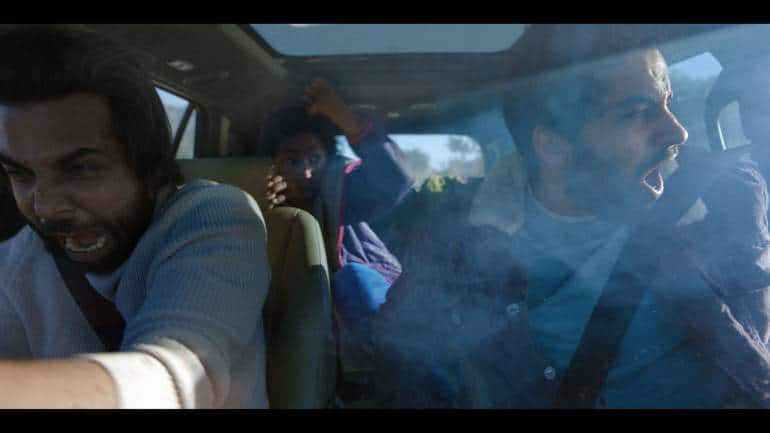 A still from Stolen.
A still from Stolen.He further adds, “Misinformation is a part of our life today. In our story, it’s coming from the phenomenon of WhatsApp lynchings. Stolen’s working title was Bhed (herd). We all understood that this has thematic ramifications and we obviously chose it for that reason.” And, quite naturally, he is finding it difficult “to sell the film in India”. While Paris-based sales company Charades has boarded international sales on Stolen, Tejpal and producer Gaurav Dhingra of Jungle Book Productions have still not found a distributor in India. “You needed an A-lister hero for that but I would not change anything about this film. In our country everything is privately funded and private funders will never look at cinema as a tool for expression or experimentation. They are always going to be doing one thing for five years. I had no qualms with struggling and holding out for something like Stolen,” says Tejpal, “Bollywood throttles every other form in our country. It would be nicer if it didn’t have the whole pie and left some for others, too.”
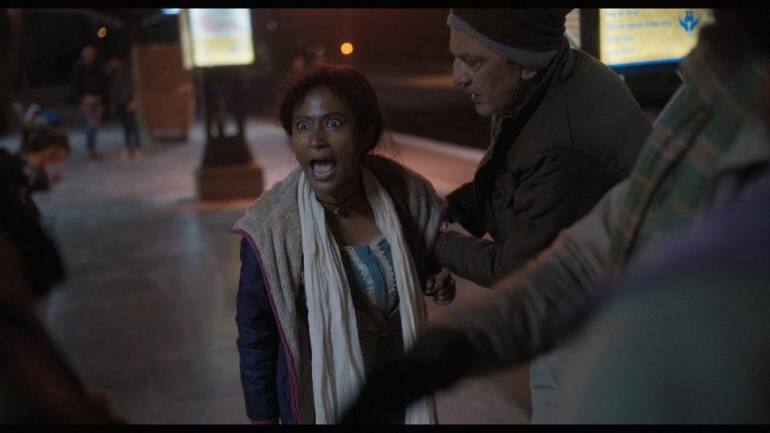 A still from Stolen.
A still from Stolen.Tejpal has had his brush with the Hindi film industry as an AD (assistant director), from Rajkumar Hirani’s Lage Raho Munna Bhai (2006), 3 idiots (2009), Delhi 6 (2009) to Rajesh Mapuskar’s Ferrari Ki Sawaari (2012). Tejpal, the Army kid, was sent to a boarding school in Ajmer at age 10, graduated from Delhi University’s St Stephen’s with subpar attendance, took to horse polo, but knew the rich man’s game was unsustainable. With no real degree in hand and a little help from his friends, he landed in Bombay, did a series of odd jobs for a decade in the film industry and spent a year at New York Film Academy. “I didn’t learn much filmmaking in Bollywood, but learnt some technical stuff. Before that, I didn’t even know what a camera looks like. I also learnt the work ethos, set culture, filmmaking business,” he says.
So when his producer demanded a known face for Stolen, Tejpal lucked out with Banerjee, whose work in Ajji had blown his mind. Banerjee is both a known face and a brilliant actor who has a very unusual look, “not like a usual protagonist or the film faces we export from this country. That was important for me. Even in Bollywood films, where everything is on higher scales, Abhishek plays on the lower scales to give impactful performances,” says Tejpal. Banerjee can do comedy (Stree) and villainy (Ajji), studio production (Bhediya) and indie film (Bhonsle) with cogent élan.
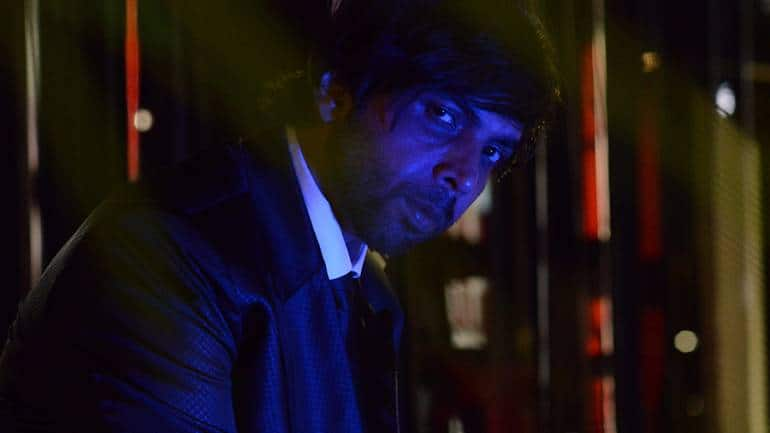 Stolen actor Abhishek Banerjee at Venice International Film Festival. (Photo: Stephanie Cornfield)
Stolen actor Abhishek Banerjee at Venice International Film Festival. (Photo: Stephanie Cornfield)Tejpal shares a Delhi connection with his cast. Kharagpur’s Banerjee and Shubham graduated from Delhi University’s Kirori Mal College, whose dramatic society, The Players, sharpened their stage act, while Mia Maelzer, real name Aditi Roy Maelzer from Panihati (West Bengal), graduated from the National School of Drama (NSD).
Was a body double used for Banerjee, who gets punched and pounded in Pushkar’s by-lanes? “Only once,” admits Tejpal, “Most of the time when you can see him, it’s him, the camera was cut close to him. Where you can’t see him, we used a body double for the character to get beaten up.” “Stolen has been a life-changing experience. The process was like living a lifetime, with hurdles all around, safety always seemed a far reach, but in the end we all landed ashore probably safer than we’d imagined. KT (Tejpal) imagined the world and we played our parts,” says Banerjee, who’s all praise for the new director’s new-age Indian cinema and for producer Dhingra’s “guts and glory, the courage to create disruptions.”
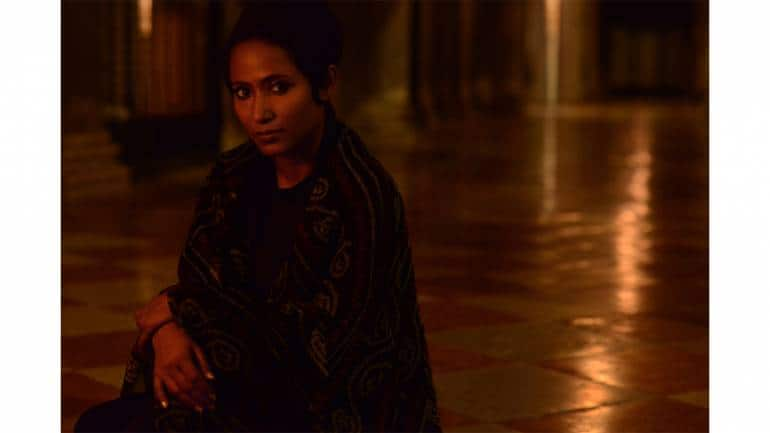 Stolen actor Mia Maelzer at Venice International Film Festival. (Photo: Stephanie Cornfield)
Stolen actor Mia Maelzer at Venice International Film Festival. (Photo: Stephanie Cornfield)Maelzer was next to be signed, who came in a more traditional way, through casting director Dilip Shankar. There’s a latent fire in her act nearly reminiscent of the league of the extraordinary Smita Patil, Nandita Das, Seema Biswas and Sreela Majumdar. It would be tragic if she’s lost in the obscure corridors of independent cinema alone. Alongside Stolen, Maelzer’s French film La Tresse/The Braid also screened at the recent IFFK. To her credit, for her role as Jhumpa, Maelzer did all the legwork and ground research in Basanti in Bengal’s Sundarbans. She met local women, studied their lives, diligently took notes on the nexus of using and abandoning women and reported all that to Tejpal, “who’d cull out the important links crucial for our story.” She’s glad that the women believed in her ability to “not portray them as victims on screen” and relieved that “they were happy I looked like them.” Maelzer says, “With Stolen began this ironic story where everyone was given the same objective but they were intertwined through various paths polarised between dynamic moral compass. All the characters were given unique and hyper positions to justify their actions. The result is an emotionally strong film.”
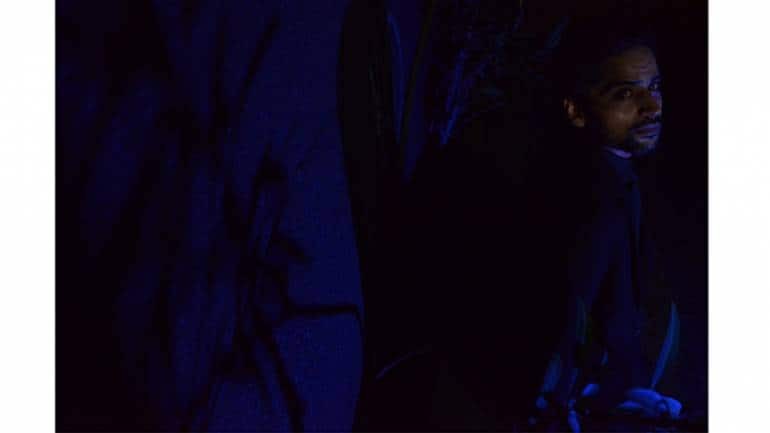 Stolen actor Shubham at Venice International Film Festival. (Photo: Stephanie Cornfield)
Stolen actor Shubham at Venice International Film Festival. (Photo: Stephanie Cornfield)Equally hands-on on the set was Shubham, who completes the cast trio. When not doing his scenes, he’d set-up the background, do art design, and be Tejpal’s aide in tweaking others’ dialogues as well. Known more for having written Prateek Vats’ distinctive Eeb Allay Ooo! (2019) than for his role as the teacher in Sikkim from Karma Takapa’s Ralang Road (2017), Shubham’s casting as Raman was done on a whim. “For the other brother, I was desperate to cast two actors who have a long-standing intimate relationship. Abhishek and Shubham share a 20-year-old friendship. I knew this was going to be a winning combo the moment I heard the way Abhishek spoke to him on the phone, like real brothers,” says Tejpal.
“Physically, this shoot was one of the most challenging experiences I’ve ever had. Every scene was charged with tension and a palpable sense of urgency. The nature of the cinema vérité style meant there was scarcely any time for relaxation. The most intriguing aspect of portraying Raman was navigating his relationships with characters like Jhumpa and Gautam. Despite Jhumpa being worlds apart from Raman, they manage to forge a connection through the universal language of emotions. Conversely, delving into Raman’s strained relationship with his own brother proved to be immensely compelling. Despite their closeness, they perceive the world through markedly different lenses, inevitably leading to clashes between them. Charting the fluctuating dynamics of that relationship was challenging, yet simultaneously gratifying,” says Shubham.
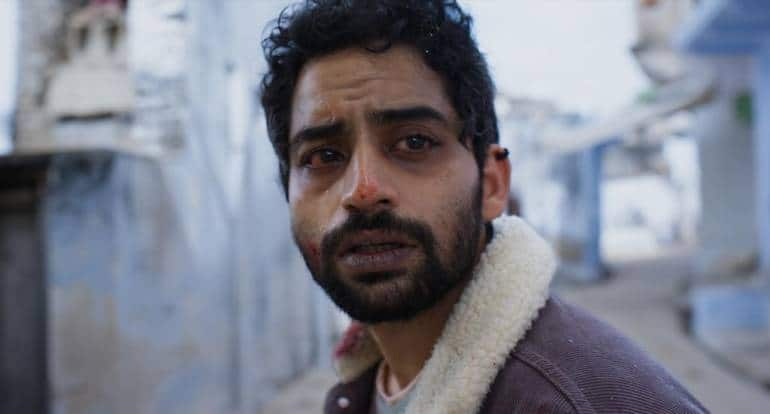 A still from Stolen.
A still from Stolen.Tejpal’s style is elimination. He doesn’t give any backstory about the brothers’ dispute nor does he explain how the Punjabi Gautam could speak fluent Bangla with the tribal woman. Once the plot gets on the four-wheel drive, Tejpal literally cuts to the chase. “All of that is fluff for me. I don’t want anything to take the viewer away from the main story. I also want to leave a lot unsaid because then people come up with interesting theories. It creates for more exciting storytelling than flat narratives,” he says.
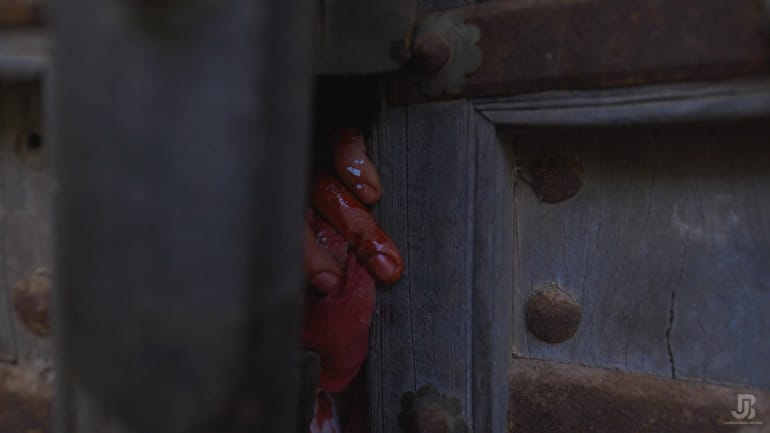 A still from Stolen.
A still from Stolen.Stolen keeps you hooked like Good Time (2017) and Victoria (2015). Tejpal’s filmmaking is stylistically inspired by the Korean and Mexican New Wave. New Zealand-based Shreyas Beltangdy (Last Film Show, Angry Indian Goddesses, X: Past is Present), who edited the film online, has kept it tight and intense. The immersive sound design by Susmit ‘Bob’ Nath (Writing with Fire, All That Breathes, Bhavesh Joshi Superhero, Bulbul Can Sing, Psycho Raman) builds suspense. The film’s long, unbroken shot of thrill, tension and intricacy takes from Son of Saul (2015) while the immersive experience where the audience is put right in the middle of the action is achieved by using wide lenses like Christopher Nolan did in Dunkirk (2017). First-time cinematographer Ishan shot on two lenses: 25 mm and 32 mm and on the rarely used 2:1 aspect ratio (Univisium). About 95 per cent of the film is shot from a single perspective and in real-time, except when inside the car, “there, it’s not possible that I don’t cut, I don’t want to make a boring film with a static camera,” says Tejpal.
Discover the latest Business News, Sensex, and Nifty updates. Obtain Personal Finance insights, tax queries, and expert opinions on Moneycontrol or download the Moneycontrol App to stay updated!
Find the best of Al News in one place, specially curated for you every weekend.
Stay on top of the latest tech trends and biggest startup news.